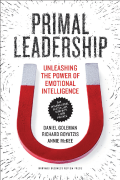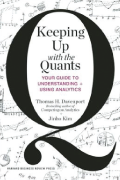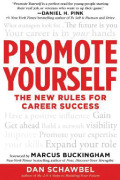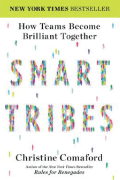TD Magazine Article
The Power of Self-Aware Leadership
A review of Primal Leadership: Unleashing the Power of Emotional Intelligence by Daniel Goleman, Richard Boyatzis, and Annie McKee
Sun Sep 08 2013

Primal Leadership: Unleashing the Power of Emotional Intelligence
By Daniel Goleman, Richard Boyatzis, and Annie McKee
(Harvard Business Review Press, 306 pp., $22)
Word-association games would pair "emotional intelligence" with "Daniel Goleman." Goleman, an internationally renowned psychologist, pioneered the concept of emotional intelligence—a keen awareness of others' emotions and how to influence them—a term that is now a fixture in the business lexicon. His groundbreaking book Emotional Intelligence reveals how to develop and wield this kind of intelligence at work, home, and any other social setting in which you wish to achieve something with the help of others.
Goleman's follow-up, Primal Leadership: Learning to Lead With Emotional Intelligence, reframes the concept of emotional intelligence for workplace leaders. The book, which explores how successful leaders interact with their employees, was published to great accolades from leading thinkers in management and workforce development.
Now, in a refreshed edition that takes into account the rise of technology and the global economy, Goleman and co-authors Richard Boyatzis and Annie McKee re-examine the far-reaching power of self-aware leadership.
This latest book, Primal Leadership: Unleashing the Power of Emotional Intelligence, will take its place on the bookshelf of classic business literature as a timely resource for those aspiring to lead on the cutting edge of today's business environment. And as the authors point out in the preface, "There are many leaders, not just one. Leadership is distributed. It resides not solely in the individual at the top, but in every person at every level who, in one way or another, acts as a leader to a group of followers." This spirit of joint accountability for excellent leadership runs throughout the book.
Although it discusses neurological research, the latest Primal Leadership, like its predecessors, is in plain-speak. Thoroughly action-oriented, it breaks down the qualities making up "primal"—or resonant—leadership, discussing how to develop each one, with specific examples from various organizations.
It does the same with the qualities that make up dissonant leadership. Even the chapter titled "The Neuroanatomy of Leadership" begins by discussing the critical importance of simple humor in leading effectively, and moves on to advice on how to increase self-awareness by examining your inner dialogue.
An especially helpful section in this chapter is "The Smart Guess," which shows readers how to combine data with intuition to make wise decisions—because as the authors point out in an encapsulation of the book's essence, gut feelings are data too.
Keeping Up With the Quants: Your Guide to Understanding and Using Analytics

By Thomas Davenport and Jinho Kim
(Harvard Business Review Press, 240 pp., $27)
Are you at a loss with what to do with your data? Although data are now used extensively to make business decisions, many still struggle with basic analytical thinking. Yet a recent McKinsey report projected that the United States alone will need 1.5 million people for "big data jobs" by 2018. No matter what field you are in, it is critical to know how to analyze quantitative information. Written for readers without a business degree or background in statistics, Keeping Up With the Quants explains how to read, interpret, and glean value from your data.
Promote Yourself: The New Rules for Career Success

By Dan Schawbel
(St. Martin's Press, 272 pp., $24.99)
If you want to get promoted, read this book. Schawbel's fresh, compelling writing style will keep you immersed in the pages of Promote Yourself as you learn timely ways to advance your career. For example, Schawbel explains how to identify and learn critical hard skills that will be needed in the future, improve your emotional intelligence, use social media to stand out in your work (with a helpful breakdown of which tools to use and how), and many more effective yet simple strategies. There are hundreds of books out there that claim to tell you how to get ahead at work. Read this one.
SmartTribes: How Brilliant Teams Become Brilliant Together

By Christine Comaford
(Portfolio/Penguin, 237 pp., $26.95)
Even if a team isn't downright dysfunctional, there is still a good chance that it's not working to its full potential. As the leader of that team, what if there was something you were doing to cripple your team's productivity? In SmartTribes, Comaford explains what these unintentional behaviors might be, and provides a systematic approach for optimizing your team's performance. Your team will work its way through Comaford's process to become a "smart tribe," all without taking time away from business priorities. Filled with practical takeaways, this book will allow you to seamlessly change your team for the better.
What's on Michael Allen's Bookshelf?
Sketching User Experiences: Getting the Design Right and the Right Design by Bill Buxton. I recommend this book to everyone because it talks about very practical, efficient, and fun ways to design user interfaces.
The Media Equation: How People Treat Computers, Television, and New Media Like Real People and Places by Byron Reeves and Clifford Nass. This research reveals how powerful media can be in reaching not only the cognitive performance of people, but also their affective perceptions that ultimately drive motivation.
First Things Fast: A Handbook for Performance Analysis by Allison Rossett. Constructively questioning common assumptions about how to design and develop learning programs led to the Successive Approximation Model (SAM), and Rossett is the master of constructive questioning. My confidence that we were moving in the right direction was strongly bolstered when I read this valuable treatise.
